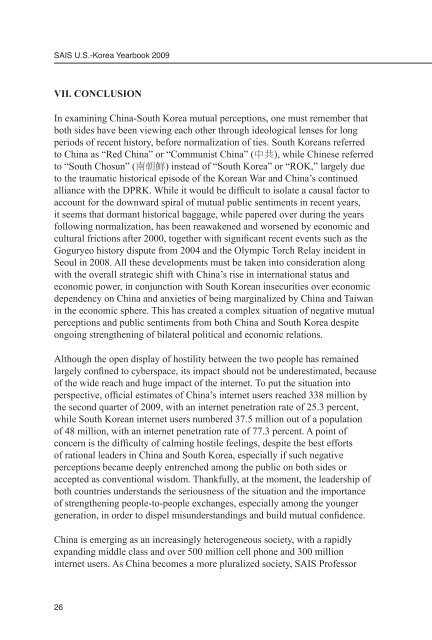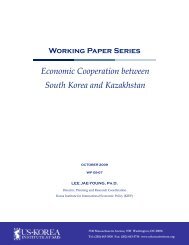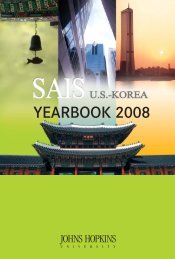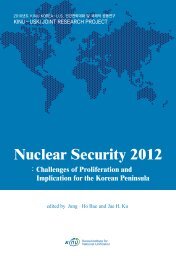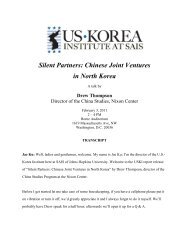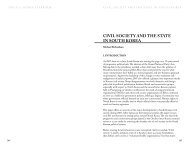US-Korea Institute at SAIS
US-Korea Institute at SAIS
US-Korea Institute at SAIS
- No tags were found...
You also want an ePaper? Increase the reach of your titles
YUMPU automatically turns print PDFs into web optimized ePapers that Google loves.
<strong>SAIS</strong> U.S.-<strong>Korea</strong> Yearbook 2009<br />
VII. CONCL<strong>US</strong>ION<br />
In examining China-South <strong>Korea</strong> mutual perceptions, one must remember th<strong>at</strong><br />
both sides have been viewing each other through ideological lenses for long<br />
periods of recent history, before normaliz<strong>at</strong>ion of ties. South <strong>Korea</strong>ns referred<br />
to China as “Red China” or “Communist China” (), while Chinese referred<br />
to “South Chosun” () instead of “South <strong>Korea</strong>” or “ROK,” largely due<br />
to the traum<strong>at</strong>ic historical episode of the <strong>Korea</strong>n War and China’s continued<br />
alliance with the DPRK. While it would be difficult to isol<strong>at</strong>e a causal factor to<br />
account for the downward spiral of mutual public sentiments in recent years,<br />
it seems th<strong>at</strong> dormant historical baggage, while papered over during the years<br />
following normaliz<strong>at</strong>ion, has been reawakened and worsened by economic and<br />
cultural frictions after 2000, together with significant recent events such as the<br />
Goguryeo history dispute from 2004 and the Olympic Torch Relay incident in<br />
Seoul in 2008. All these developments must be taken into consider<strong>at</strong>ion along<br />
with the overall str<strong>at</strong>egic shift with China’s rise in intern<strong>at</strong>ional st<strong>at</strong>us and<br />
economic power, in conjunction with South <strong>Korea</strong>n insecurities over economic<br />
dependency on China and anxieties of being marginalized by China and Taiwan<br />
in the economic sphere. This has cre<strong>at</strong>ed a complex situ<strong>at</strong>ion of neg<strong>at</strong>ive mutual<br />
perceptions and public sentiments from both China and South <strong>Korea</strong> despite<br />
ongoing strengthening of bil<strong>at</strong>eral political and economic rel<strong>at</strong>ions.<br />
Although the open display of hostility between the two people has remained<br />
largely confined to cyberspace, its impact should not be underestim<strong>at</strong>ed, because<br />
of the wide reach and huge impact of the internet. To put the situ<strong>at</strong>ion into<br />
perspective, official estim<strong>at</strong>es of China’s internet users reached 338 million by<br />
the second quarter of 2009, with an internet penetr<strong>at</strong>ion r<strong>at</strong>e of 25.3 percent,<br />
while South <strong>Korea</strong>n internet users numbered 37.5 million out of a popul<strong>at</strong>ion<br />
of 48 million, with an internet penetr<strong>at</strong>ion r<strong>at</strong>e of 77.3 percent. A point of<br />
concern is the difficulty of calming hostile feelings, despite the best efforts<br />
of r<strong>at</strong>ional leaders in China and South <strong>Korea</strong>, especially if such neg<strong>at</strong>ive<br />
perceptions became deeply entrenched among the public on both sides or<br />
accepted as conventional wisdom. Thankfully, <strong>at</strong> the moment, the leadership of<br />
both countries understands the seriousness of the situ<strong>at</strong>ion and the importance<br />
of strengthening people-to-people exchanges, especially among the younger<br />
gener<strong>at</strong>ion, in order to dispel misunderstandings and build mutual confidence.<br />
China is emerging as an increasingly heterogeneous society, with a rapidly<br />
expanding middle class and over 500 million cell phone and 300 million<br />
internet users. As China becomes a more pluralized society, <strong>SAIS</strong> Professor<br />
26


